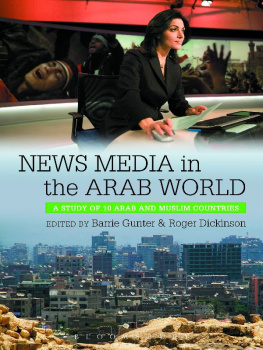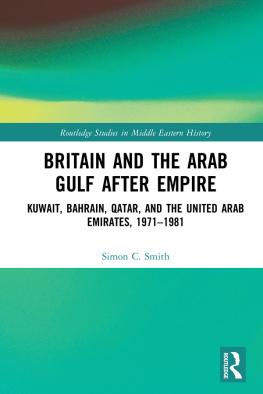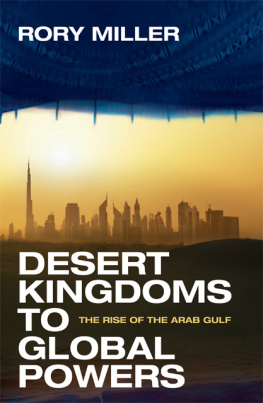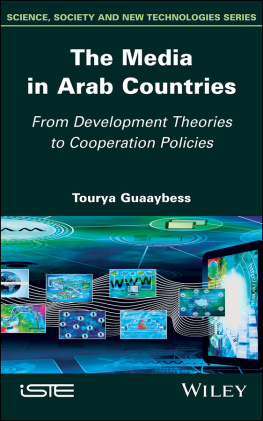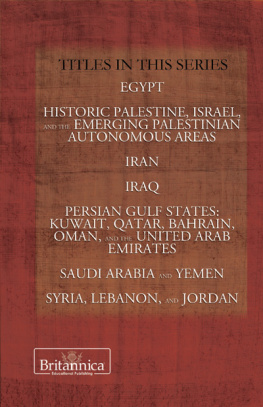News Media in the Arab World
A study of 10 Arab and
Muslim countries
EDITED BY
BARRIE GUNTER
AND ROGER DICKINSON

Bloomsbury Academic
An imprint of Bloomsbury Publishing Plc
1385 Broadway New York NY 10010 USA
50 Bedford Square London WC1B 3DP UK
www.bloomsbury.com
First published 2013
Barrie Gunter, Roger Dickinson, and Contributors 2013
All rights reserved. No part of this publication may be reproduced or transmitted in any form or by any means, electronic or mechanical, including photocopying, recording, or any information storage or retrieval system, without prior permission in writing from the publishers.
No responsibility for loss caused to any individual or organization acting on or refraining from action as a result of the material in this publication can be accepted by Bloomsbury Academic or the author.
Library of Congress Cataloging-in-Publication Data
News media in the Arab world: a study of 10 Arab and Muslim countries / edited by Barrie Gunter and Roger Dickinson.
pages cm
Includes bibliographical references and index.
ISBN 978-1-4411-1407-5 (hardcover: alk. paper)
ISBN 978-1-4411-7466-6 (pbk.: alk. paper) 1. Journalism Arab countries. 2. Press Arab countries. 3. Television broadcasting of news Arab countries. 4. Broadcast journalism Arab countries. 5. Reporters and reporting Arab countries. 6. Journalism Objectivity Arab countries. 7. Mass media Arabic countries. I. Gunter, Barrie editor of compilation. II. Dickinson, Roger 1956 editor of compilation.
PN5359.N49 2013
073.927dc23
2012050838
ISBN: 978-1-4411-4488-1
Contents
Barrie Gunter and Roger Dickinson
Khalid Al-Jaber and Barrie Gunter
Ahmed Al-Rawi and Barrie Gunter
Zaki Hasan Nuseibeh and Roger Dickinson
Hamza Mohammed and Barrie Gunter
Mokhtar Elareshi and Julian Matthews
Khalid Al-Jaber and Barrie Gunter
Ebrahim Abdulrahman Al-Shaikh and Vincent Campbell
Roger Dickinson and Barrie Gunter
T he contributors comprise academic members of staff at the Department of Media and Communication, University of Leicester and a number of Arab authors who are current (Al-Shaikh,) or recent (Al-Jaber, Al-Rawi, Elareshi, Mohammed, Nussibeh) students at the department. Three of the latter (Al-Shaikh, Elareshi, Mohammed) are academics in their own countries where they teach about media and communication, and the other two (Al-Jaber, Nuseibeh) are journalists. The writing team therefore embraces experienced academic authors and members with specialist knowledge of media in the Arab world.
Khalid Al-Jaber is the research director of The Peninsula, an Arabic daily newspaper in Qatar. Al-Jabers interest and expertise are in communication research spanning a wide range of areas from global media organizations to international communication, mass media in Middle East and Arab Gulf region, and public diplomacy. He studied for his PhD at the Department of Media and Communication, University of Leicester between 2009 and 2012.
Ebrahim Abdulrahman Al-Shaikh is a PhD student of Media in the Department of Media and Communication, University of Leicester. He has also been employed as a journalist by Akbhar Al-Kaleej, an Arabic daily newspaper in Bahrain. He is interested in political and cultural communication issues in the Middle East, particularly in the Arab Gulf region.
Vincent Campbell is a lecturer in the Department of Media and Communication. He is the author of Information Age Journalism: Journalism Studies in International Context (Arnold, 2004) and has written journal articles, books chapters and other publications on journalism and political communication. Among his specialist areas of interest are international political communication and the relationship between journalism, new media and politics.
Roger Dickinson is a Senior Lecturer in the Department of Media and Communication at the University of Leicester. His research interests include the sociology of journalists and journalism, the study of media audiences and the media and health. His most recent work on journalists and journalism has appeared in Journalism Studies, Cultural Sociology, Journalism, Theory, Practice and Criticism and The Routledge Companion to Journalism Studies (edited by Stuart Allan).
Mokhtar Elareshi obtained his PhD at the Department of Media and Communication, University of Leicester in 2012. His thesis was based on research on the impact of international satellite TV news services on the consumption of indigenous news services in Libya. He has taught at the University of Libya, Tripoli.
Barrie Gunter is a Professor of Mass Communication, Department of Media and Communication. He is an author of 50 books and more than 250 journal articles, book chapters and other publications on media, marketing and management issues. Among his specialist areas of interest are media audiences, new media developments and the impact of news.
Julian Matthews is a Lecturer in the Department of Media and Communication at the University of Leicester. He is the Communication and Media Section Editor for the international journal Sociology Compass and is a Convenor of the British Sociological Association Media Study Group. His research interests include the production of news, journalism and its representations of health, the environment and other social issues. He has published work in a range of academic journals.
Hamza Mohammed obtained his PhD from the Department of Media and Communication, University of Leicester in 2008. He has worked as a journalist and in public relations in the Middle East and currently teaches at the University of Sharjah. His research interests centre on news and agenda-setting.
Zaki Hasan Nuseibeh is a Palestinian journalist, teacher and writer. He has worked in the Palestinian news industry since 1974. He holds a BA degree in Arabic Language and Literature from the Hebrew University in Jerusalem and an MA in Mass Communications from the University of Leicester.
Barrie Gunter and Roger Dickinson
N ews markets are evolving dramatically in the Middle East and across North Africa. The emergence of the internet and of satellite television (TV) news channels has changed the media landscape in these countries and provided new media experiences for the indigenous populations. New media have been embraced in particular by younger people in the Arab world. These changes have implications for the way news businesses are run and regulated in the region. They have created greater competition for audiences and placed some established news providers under threat. These initial tasters have whetted public news appetites across the Arab world and created a hunger for less parochial news coverage. Whether this is seen as good or not varies between countries. The news is important to Arab populations, but the question of what now constitutes valued news has become more open as wider choices of news have been made available.
Even though the media landscape in Arab world has changed dramatically since the end of the twentieth century, characterized in particular by the emergence of TV satellite channels and penetration of the Internet, there is still a disjunction between the promises carried by these technology developments and the realities of Arab politics and societies (Amin, 2001). One media typology has distinguished between the mobilized press controlled by government, loyalist press that is privately owned yet loyal to the current government and therefore succumbs to direct or indirect government censorship, and a diverse press that can operate with relative freedom (Rugh, 1979). Until the 1990s, the Arab press tended mostly to fall into the category of a mobilized press although some news operations could be conceived as loyalist (Hafez, 2001). Thus, the mass media have remained under the tight control of Arab governments. In general, in this region, the media have been little more than extensions of government information ministries (Rugh, 2004). It remains to be seen how far this will change in those Arab countries that experienced political revolutions in 2011. These actions were driven often by young people who utilized digital technologies to organize protests and publicize them to the outside world. When their governments closed down even more tightly on media news operations, individual activists created their own news channels via blogging, microblogging and social media sites on the internet (see Diamond, 2012).
Next page
